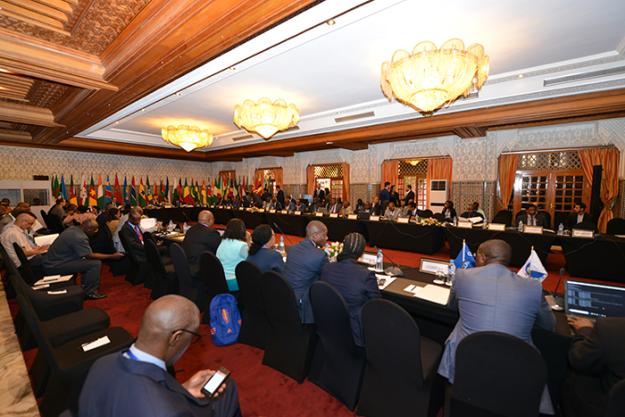
National Authorities and customs administrations from Africa
THE HAGUE, Netherlands – 2 July 2018 – National Authorities and customs administrations from Africa discussed the mechanisms to tighten controls over the transfers of scheduled chemicals, during the 16th Regional Meeting of States Parties from Africa, held in Marrakech, Kingdom of Morocco, from 19 to 21 June.
In the opening remarks – delivered on his behalf by the Director General for Bilateral Relations and Regional Affairs, Mr Fouad Yazough – the Moroccan Foreign Minister, H.E. Mr Nasser Bourita said that the use of chemical weapons by non-State actors constituted a serious threat to international peace and security. The Minister underlined that customs bodies must help to uphold security by watching over the cross-border transfers of toxic chemicals.
Senior Programme Officer of the Organisation for the Prohibition of Chemical Weapons (OPCW), Mr Pavlo Byalyk, stated that the cooperation between National Authorities and customs is a prerequisite for the enforcement of the chemical transfer regime. “The OPCW, in partnership with the World Customs Organization, has provided a rich array of capacity-building programmes for our Member States in this area,” he added.

During the meeting, the participants emphasised the importance of the laws and regulations pertaining to the trade in toxic chemicals, and reviewed the capacity and needs of customs administrations in enforcing trade controls. Discussions also focused on the improvement of synergies between National Authorities and customs bodies, as well as within regional networks.
The meeting further benefited from the contributions of international and regional organisations, including the UN 1540 Committee’s Group of Experts, the World Customs Organization, the East African Community, the Economic Community of Central African States, and the Intergovernmental Authority on Development.
This annual regional meeting was attended by representatives of 39 OPCW Member States, including Algeria, Angola, Benin, Botswana, Burkina Faso, Burundi, Cameroon, Congo, Congo-Brazzaville, Cote d’Ivoire, Ethiopia, Gambia, Ghana, Guinea, Kenya, Lesotho, Madagascar, Malawi, Mali, Mauritius, Mauritania, Morocco, Mozambique, Namibia, Niger, Nigeria, Rwanda, Sao Tome and Principe, Senegal, Seychelles, Sierra Leone, South Africa, Sudan, Tanzania, Togo, Tunisia, Uganda, Zambia, and Zimbabwe.
Background
As the implementing body for the Chemical Weapons Convention, the OPCW oversees the global endeavour to permanently and verifiably eliminate chemical weapons. Since the Convention’s entry into force in 1997 – and with its 193 States Parties – it is the most successful disarmament treaty eliminating an entire class of weapons of mass destruction.
Over 96% of all chemical weapon stockpiles declared by possessor States have been destroyed under OPCW verification. For its extensive efforts in eliminating chemical weapons, the OPCW received the 2013 Nobel Peace Prize.
